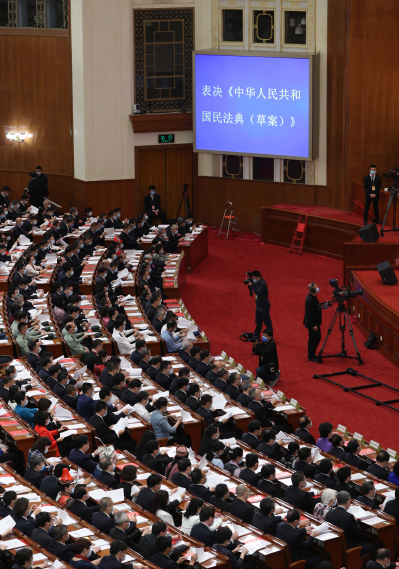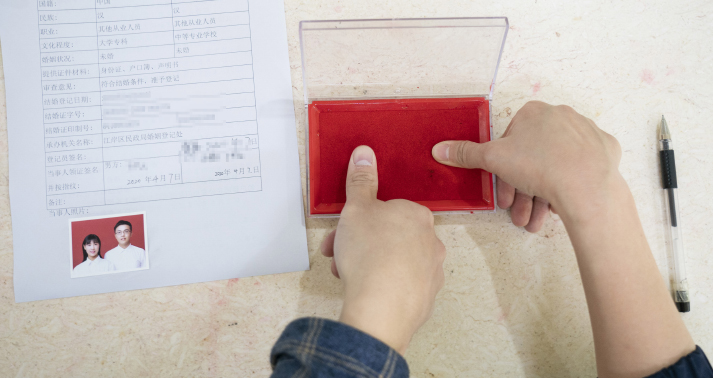|
||||||||||
| Home Nation World Business Opinion Lifestyle ChinAfrica Multimedia Columnists Documents Special Reports |
|
||||||||||
| Home Nation World Business Opinion Lifestyle ChinAfrica Multimedia Columnists Documents Special Reports |
| ChinAfrica |
| After decades of preparation, China enacts its Civil Code |
| The Civil Code of China finally comes to life and was adopted at the Third Session of the 13th National People's Congress on May 28 |
| By Yuan Yuan & Ge Lijun VOL.12 July ·2020-06-30 |

The Civil Code of China, anticipated for decades, finally came to life and was adopted at the Third Session of the 13th National People's Congress (NPC), top legislature of the country, on May 28. The Civil Code will take effect on January 1, 2021.
Jin Ping, a 98-year-old retired law professor of Southwest University of Political Science and Law in Chongqing in southwest China, said he was "overjoyed" at the news in an interview with Xinhua News Agency, adding that it was a "blessing" for him to see his lifelong goal come to fruition.
A long process
Formulating a Chinese civil code has been a long cherished wish of generations of civil law scholars over the past few decades.
Sun Xianzhong, a research fellow at the Law Institute of the Chinese Academy of Social Sciences and a deputy to both the 12th and 13th NPC, was an arduous promoter of such a code.
"The current civil law system is a patchwork of fragmented legislation," he told China Youth Daily. Since 1980, China has successively promulgated a series of separate laws including the Marriage Law, the Adoption Law, the Contracts Law and the Property Law, which for a long time have served as the basis for judicial practice in civil cases.
The General Principles of the Civil Law, enacted in 1986 as the foundation for the civil law system, could hardly meet the demand of the society today, Sun explained. Some articles in the General Principles even contradict other laws.
"There are gaps and inconsistencies among the separate laws," Sun said. "To set up an overarching framework for civil rights to refine the country's basic legal system had become an urgent issue for the Chinese law-making community."
In 2013, the first year he served as an NPC deputy, Sun took the lead and submitted a proposal for compiling a civil code. In 2014, he submitted the same proposal. In that year, the Fourth Plenary Session of the 18th Communist Party of China (CPC) Central Committee called for progress in drafting a unified civil code.
After that, a two-step strategy was adopted. The NPC would first enact the General Provisions of the Civil Law, which would be followed by a review of each section of the Civil Code by the NPC Standing Committee. Finally, the General Provisions would be combined with the drafts of individual sections to form a draft civil code, which would be submitted to the NPC for final deliberation. In March 2015, the NPC Standing Committee set up a special work group for the drafting. In June 2016, it deliberated on the first draft of the General Provisions of the Civil Law, and on March 15, 2017, the General Provisions was passed at the annual NPC session, marking a milestone in the progress toward a full-fledged civil code.
In April 2017, compilation of six specific sections of the Civil Code was launched, and in late 2019, the complete draft made its debut after the General Provisions was combined with the six draft sections and opened to the public for opinions.
Zhang Yesui, spokesperson for this year's NPC session, said on May 21 that in the Civil Code's compiling process, the NPC collected 10 rounds of public opinions online and received over 1 million pieces of advice and suggestions from some 425,000 people. In addition, legislators went to many areas nationwide to investigate key issues.
Wang Liming, a law professor and Vice President of Renmin University of China (RUC), told ChinAfrica that the legislators listened intently to the opinions of all parties and improved relevant rules in a timely manner. The draft Civil Code submitted to the NPC for deliberation had been changed based on various opinions.
In February, Chen Haiyi, an NPC deputy and chief judge at the Juvenile Criminal Tribunal of the Guangzhou Intermediate People's Court in Guangdong Province in south China, submitted a suggestion to the NPC Standing Committee on improving regulations on guardianship as some children couldn't get proper care while their parents were quarantined because of the novel coronavirus epidemic prevention and control. To her delight, Chen found that the draft Civil Code had specific provisions concerning new problems such as emergency situations like epidemic prevention and control, a response to her suggestion.
On May 28, one day before Jin's birthday, the draft Civil Code was adopted by the NPC. "It is a landmark achievement in China's law-making history," Jin said. "I'd like to regard it as my best ever birthday gift."

Full protection
As the first legislative package called a "code" since the founding of the People's Republic of China in 1949, the Civil Code consists of 1,260 articles in seven volumes, including almost every aspect related to people's lives.
"The Civil Code protects people's rights to the fullest," Sun told ChinAfrica. "It lays an important legal and institutional foundation for the modernization of the country's governance system and capacity."
"It comes at a time when Chinese society is experiencing a major transformation in its development," Li Shenglong, Vice President of Chongqing No.1 Intermediate People's Court, told China Today. "Some of the code's articles concerning environmental protection the aging population are noteworthy."
"One of the highlights in the Civil Code is the section dedicated to personality rights," Wang told ChinAfrica. "This will undoubtedly increase the protection of ordinary Chinese people's rights."
The term "dignity of life" has been introduced in this section. Yang Lixin, a law professor at RUC, defined it as the dignity of birth, life and death. With this provision, a person can choose to refuse or accept hospice care or hospital treatment.
The term "peace of private life" grants people protection from illegal intrusion through activities such as peeping, eavesdropping and spam emails. Data collectors have a duty to protect an individual's personal information and cannot obtain, disclose or conduct transactions of this data without individual consent.
The code also responds to issues arising from the development of hi-tech and life sciences. Natural persons' voice is protected by the code as a right of personality. "With the development of artificial intelligence, natural persons' voice is more widely used on more occasions," Fang Yan, principal partner of the Beijing law firm JT&N and an NPC deputy, said. "The Civil Code has adapted to the fast development of science and technology."
In the marriage law section, a cooling-off period of 30 days for couples wanting to divorce has drawn wide attention. Couples who file for divorce by agreement must wait 30 days to reconsider their decision. If they change their mind, they can withdraw their divorce application within the 30 days, and after the waiting period, those who still want to divorce will receive their official documents. Cases of domestic violence or divorce lawsuits are exempted from the cooling-off period.
The new code also leaves some issues unresolved for legal professionals to continue working on. Shi Jiayou, a law professor at RUC, gave an example concerning the protection of personal information. For parties that have the right to collect personal data, the code fails to regulate how long they can keep the information and under what circumstances they must delete the data.
"Some scholars say the Civil Code will provide a universal tool for judicial organs to settle civil disputes," Qiao Xinsheng, a professor of law at Zhongnan University of Economics and Law in Guangzhou, told China Daily. "But the complexity of civil relations and the emergence of new problems due to social changes require judicial organs to understand deeply the basic spirit of the Civil Code, combine Chinese traditions and culture with the moral and ethical standards of modern society and fully comprehend the specific legal norms of the Civil Code."
Jin, a nonagenarian, said that the Civil Code still needs to be further improved and updated so that it can serve the people better.
On May 28, right after the Civil Code was adopted at the NPC, a team was set up at Southwest University of Political Science and Law to popularize it in schools, communities and rural areas.
"It's no easy task to formulate a good law, and it's even more important to make sure it is understood by the public and enforced effectively," Jin said.
(Printed Edition Title: Historic Code)
Comments to zanjifang@chinafrica.cn
| About Us | Contact Us | Advertise with Us | Subscribe |
| Copyright Beijing Review All rights reserved 京ICP备08005356号-5 京公网安备110102005860号 |